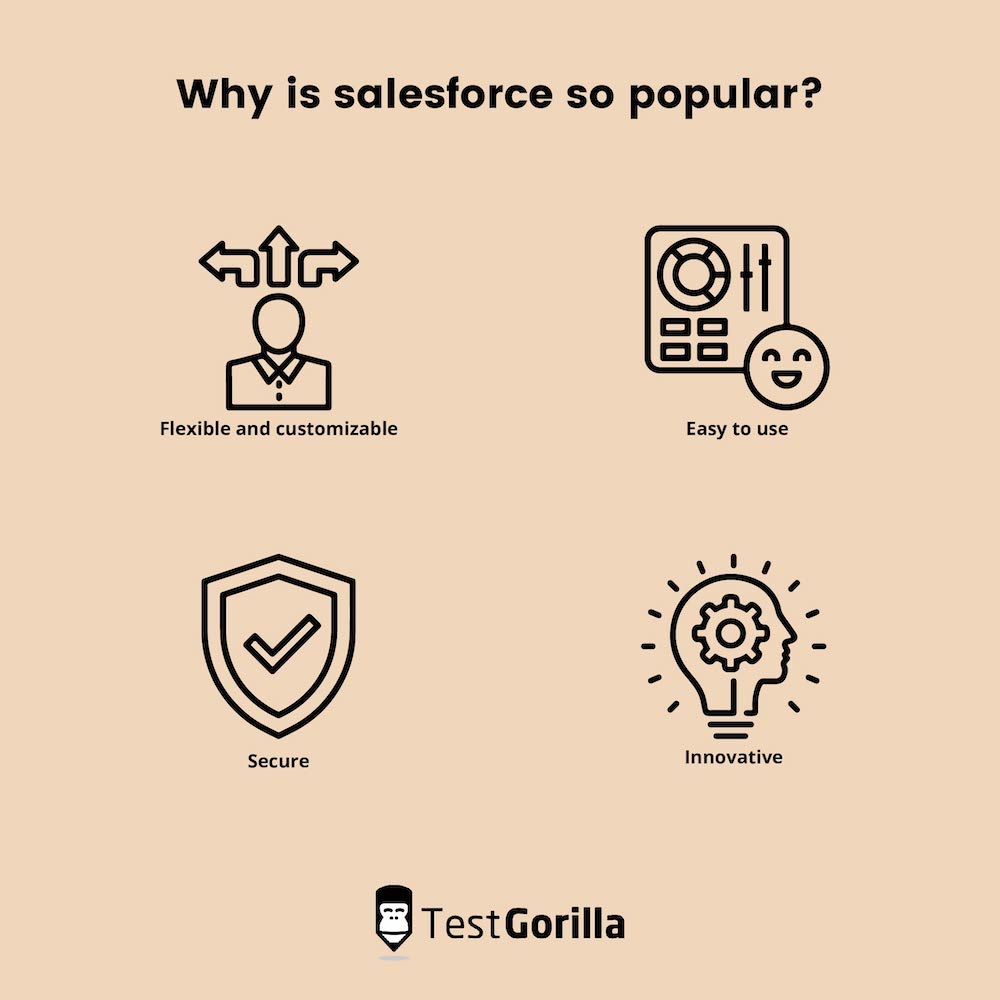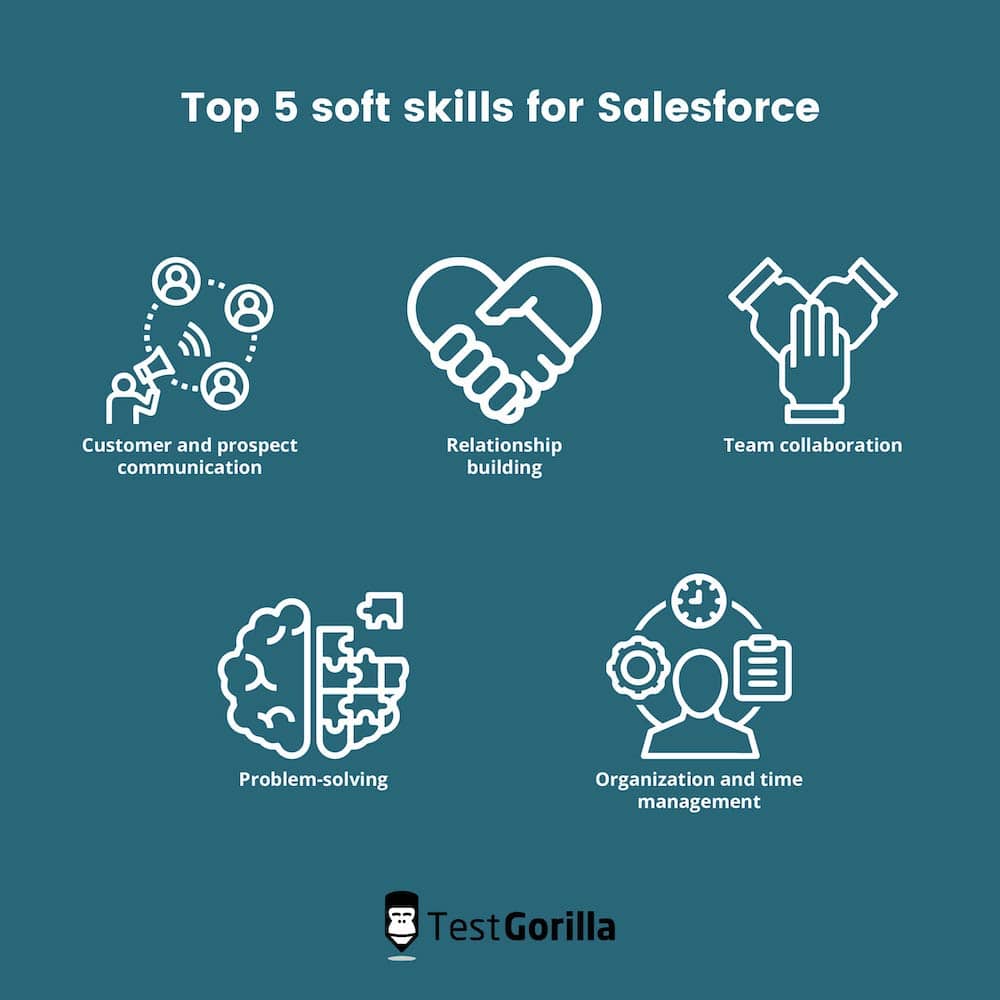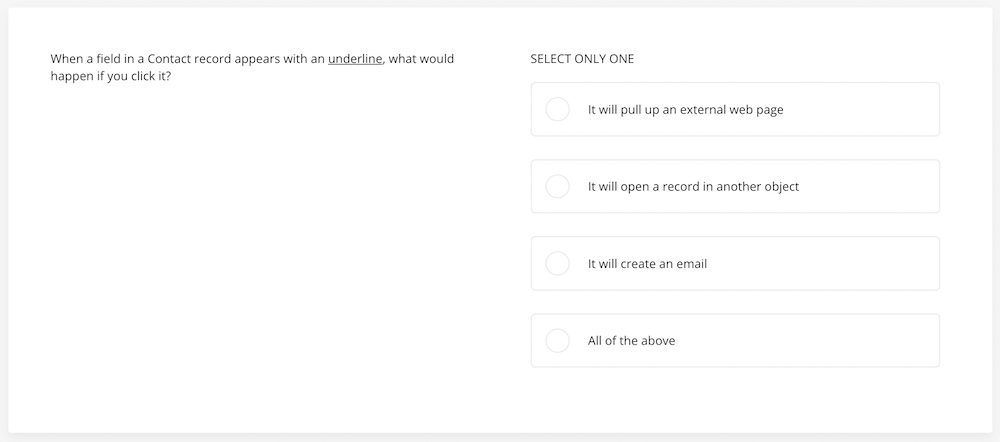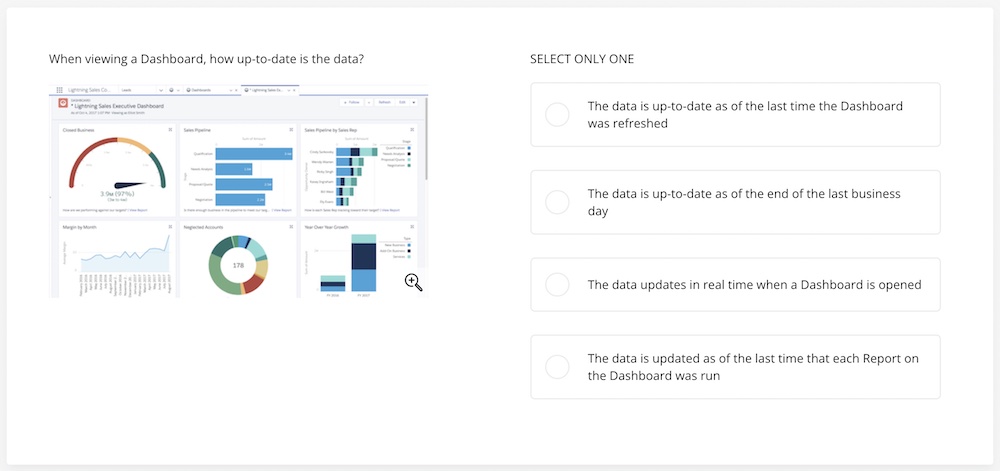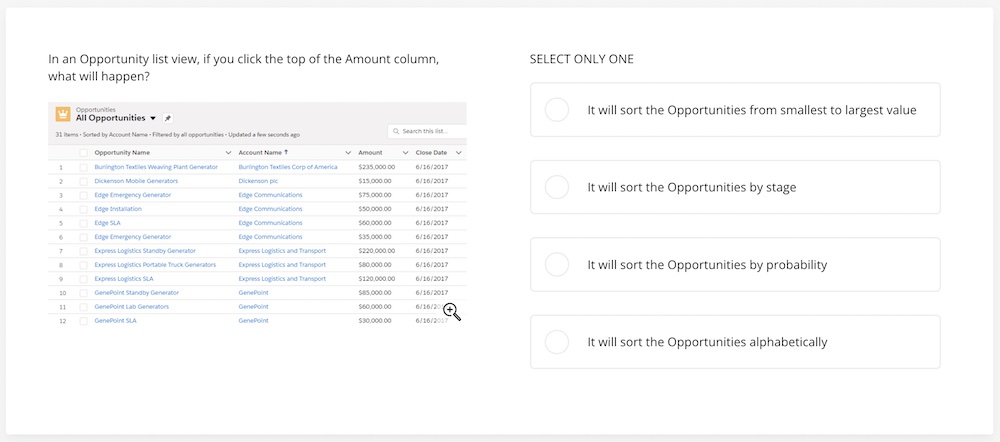More than 150,000 businesses are using Salesforce. In 2022, it has a 19.8% share of the customer relationship management (CRM) market.
If your company uses Salesforce and is hiring new salespeople, the chances are you’ll want to ensure candidates have great Salesforce skills before you hire them, and we’re here to help you with that. Read on to find out more about Salesforce skills and how to test your applicants for them.
Table of contents
What is Salesforce?
Salesforce is the world’s best-known customer relationship management software, where CRM refers to technology that manages a company’s interactions with its customers and prospects. It unites a business’s marketing, sales, commerce, service, and IT teams on one integrated CRM platform that is highly scalable and supports a large suite of connected applications.
Its product suite includes several different CRM technologies, including Sales Cloud, Service Cloud, Marketing Cloud, and Commerce Cloud and Platform. It has additional technologies too, such as Trailhead, a learning platform for Salesforce specifically, and in 2021 Salesforce officially acquired Slack for $27.7 billion dollars.
Popularity
In 2022, statistics show that 65% of businesses adopt CRM technology within the first five years of launch. And CRM use is growing after the pandemic. Companies need an effective way to connect digitally with clients, and research from Fortune Business Insights suggests that by 2028 CRM technology will be worth around $128.97 billion worldwide.
CRM is, as these numbers demonstrate, a huge market, and Salesforce dominates it worldwide. It is popular for four key reasons.
1. Flexible and customizable. The platform is designed to be highly applicable to a wide range of businesses and organizations in every sector. Salesforce allows its users to customize their efforts to monitor campaign and project success, and these processes can be automated, too.
2. Easy to use. With Salesforce, you can run a business from a single, integrated application. Its user interface is simple and thoughtfully put together, so that even those with little software and technology experience can use the platform easily.
3. Secure. Salesforce is a secure and reliable cloud-based CRM. User data is stored securely in the cloud: The company uses some of the most advanced internet security technology available, and data is only available to registered users in each organization. Secure Socket Layer (SSL) technology, which creates an encrypted link between a web server and a web browser, further protects user information.
4. Innovative. Salesforce stands out because it jumps on opportunities to innovate. It uses metadata, data that describes other data, to enable multi-tenant applications and improve response times. Users can also access multiple upgrades with advanced new features every year. Salesforce AppExchange, the world’s largest business app marketplace, is an impressive innovation that gives users access to a range of other resources.
5 top technical skills for Salesforce
Managing leads
A lead is any company or individual from a business’s target market who is interested in the products or services that the business offers. For sales reps, every lead is a potential sale. Lead management is the process of converting leads into sales, clients, and, preferably, long-term relationships. It is sometimes referred to as contact management or customer acquisition management – you can see why CRM software is important here.
Lead management is a constant process. Leads should be managed in a systematic and structured way, beginning with gathering information on prospects and ending with passing qualified leads to sale.
Marketing and sales teams put a great deal of time, money, and effort into generating leads: Any piece of content, advertisement, or contact is carried out with the intention of bringing them in.
Managing them once they’re there is something else entirely. They need qualifying, assigning, and nurturing to increase the odds of making a sale. The lead management process looks a bit like this:
Step 1: Capture leads. Ensure that each one, whether they come from web forms, emails, or social media, ends up in your CRM system.
Step 2: Track and enrich leads. Customer interactions should be recorded and research conducted to build an enriched lead profile. This should include publicly available information about prospects, such as job title and location, to help salespeople personalize sales efforts. CRM software is useful here because it can compile a record of customer interactions.
Step 3: Qualify leads. A qualified lead is a lead that’s been identified as a potential customer. Leads are qualified according to business-specific requirements, and they must be willing. CRM systems often offer their own contact scoring models to help companies qualify leads.
Step 4: Assign leads. Once a lead has been qualified, a sales rep will need to get in touch with them as soon as possible. It can be time-consuming to assign leads manually, and it’s good practice to avoid delaying response times: Research shows that 35-50% of sales are closed by the first business to respond to leads. CRM systems automate lead distribution and save companies precious time.
Step 5: Nurture leads. This should be done with the end goal of converting a lead into a sale. Again, CRM software like Salesforce can offer automation here by sending nurture campaigns to leads who are still trying to figure out if your product or service is right for them. Lead nurturing is about demonstrating value in order to convince them you can solve their pain points.
Managing opportunities
Opportunity management is the process of managing and organizing data in Salesforce. All opportunities, or potential sales, should be tracked through the sales pipeline and converted into recurring revenue.
It’s similar to managing a budget: You need to be organized, informed, and attentive to detail. Teams should have a written process, with estimated frameworks and thresholds that can be gradually refined. Organizations will often use an opportunity management system (OMS) to automate the process.
Just like good budgeting can help companies spend their money more efficiently, sales opportunity management helps spread sales budgets and resources as far as possible.
Here are some best practices for managing opportunity pipelines:
Prioritize the best leads and drop dead ones. Sales teams are better off spending their time concentrating on high-value, sales-ready leads. They should be able to quickly identify dead leads and let them go.
Monitor metrics within your opportunity pipeline. Keep your finger on the pulse of things such as the number of deals, the average size of those deals, and the time it takes to close them.
Review and improve your process frequently. Refinement is the only way to bolster efficiency and success. Where are there bottlenecks in the sales pipeline? When is prospect conversion low? Why might this be?
Keep everything updated. If details aren’t kept up to date, things can get cluttered. Metrics get skewed and information gets lost, so it’s best to keep on top of this kind of admin and update lead information at every stage.
Feed your prospects content to bolster opportunities. Strong, informative content will help prospects understand if your product or service is right for them, so it might save you time. Sales and marketing teams should coordinate to send them content that is appropriate for their stage in the pipeline.
Salesforce offers opportunity management automation which makes the process visible, logical, and faster. Users can track and manage potential sales with Salesforce Opportunities. If a team’s Salesforce admin creates a lead, Salesforce creates an opportunity when a lead is converted. Opportunities can also be created directly.
Salesforce also offers tracking updates in several fields: Stage, close date, amount, probability, and expected revenue. So, at a glance, users can see a stage, an estimated close date, a cost, the probability of a deal being closed, and the expected revenue of an opportunity.
Customer and prospect research
It’s important for sales teams to know their prospect personas so they can tailor their sales approach to increase their chances of securing a sale. Teams also need to be sure that a lead is actually a good fit for their product or service, or has the potential to be. Trying to sell cat food to someone who doesn’t have a cat is hardly time well spent.
This is where prospect research comes in. Also known as market research or prospecting, it involves finding and analyzing prospects or prospect markets so that leads can be identified. Sales teams can save a significant amount of time by researching buyers before making calls or sending emails, so it’s an important skill for your candidates to have.
Customer research is an important twin activity. By learning more about the needs, behaviors, and pain points of existing customers, sales teams can cross-analyze with leads to determine which ones might be more fruitful than others.
The importance of prospect research is clear, but, frustratingly, it’s hard to do. In a recent survey, 40% of salespeople agreed that prospecting is the most challenging part of the sales process. Luckily, teams can rely on CRM to help them take a personalized approach to sales.
CRM gives you a control room for all your interactions with prospects – the last email you sent, notes from all of your meetings, and the pitch deck you presented – so all the information you need is at your fingertips.
Sales data analysis
Salesforce’s Sales Analytics helps sales teams turn their Salesforce data into smarter sales. As we mentioned before, reviewing and refining lead and opportunity management processes is crucial for businesses. The best way for them to do this effectively is to analyze data and use the resulting metrics to evaluate what works and what doesn’t.
Here are some important sales analysis metrics:
Sales growth
Total number of opportunities created
Lead conversion rate and average conversion time
Expected revenue, also known as pipeline value
Customer lifetime value
Monthly recurring revenue (new and expansion)
Sales analysis is crucial to a sales team’s success
In a McKinsey survey of more than 1,000 sales organizations around the world, 53% of high-performing companies rated themselves as effective users of analytics. The same survey, however, found that 57% of organizations did not see themselves as effective users of advanced analytics.
Most businesses don’t know how to pull and leverage sales data effectively and don’t have experience with analytics. This is where Salesforce CRM can help. Companies who use Salesforce can use Sales Analytics to generate metrics and use this data to adjust and optimize their sales pipeline.
5 key soft skills for Salesforce
If your company relies on Salesforce CRM to manage leads and opportunities, keep track of customer and prospect research, and generate sales-related metrics, then the above skills will be crucial to find in your candidates for any sales roles.
This being said, technical skills should not be taken in isolation as a sign of a strong sales candidate. To do their jobs well, salespeople have to have good soft skills too.
There are many behaviors, habits, and personality traits that make for a strong and successful salesperson. Above all, they have to be good with people. But they also need to be able to think on their feet, communicate, and collaborate effectively.
Soft skills are vital for Salesforce because it supports and automates processes for salespeople and teams. Crucially, Salesforce can only be as helpful as the information you put into it. If the information your team is putting in there is incorrect, irrelevant, or has been entered into the CRM after the window of opportunity for a sale has closed, your organization is not going to get the most out of the software.
If you use Salesforce, the only way to ensure you hire salespeople who can use it effectively is to make sure they have a combination of technical and soft skills. Let’s break down some of the key soft skills that you’ll find in great sales candidates.
Customer and prospect communication
The importance of good communication in the workplace is a well-thumbed subject, but there are few places where more rides on customer relations than within sales teams. Fast, patient, and effective communication with prospects and customers is everything, so recruiters should utilize communication assessment tools when hiring salespeople. It’s a no-brainer.
Relationship building
Building relationships with prospects and customers is the next step, and it takes a little more than good communication. Salespeople have to be thoughtful and organized if they want to build strong relationships. Remember what people say, and check in regularly with how they’re finding your products or services.
CRM software can help with this: Salesforce, for example, has a function that shows you your most recent correspondence with prospects and customers. This can be a handy nudge, but relationship building is also about the kinds of interactions you create. Memorable customer experiences happen when people don’t just feel as if they’re being sold something.
Team collaboration
Another important soft skill is collaboration. The bigger a company gets the more delegation and workload distribution will factor into a sales team’s operations. Transparency and communication are key – no one wants to end up following the same leads as another colleague – but collaboration is vital.
Everybody will have different strengths, and candidates who are aware of their strengths and willing to offer them to team efforts will be precious to sales teams. Salesforce CRM enables collaboration using Slack and built-in social tools.
Online collaboration tools scale up productivity by 30%
Problem-solving
Salespeople will often find themselves in complex and unexpected situations. And some of them can be very emotionally charged: Unhappy or upset customers bring all sorts of emotions to sales teams. Deciding how to convince prospects that your product can solve their problems is a problem-solving exercise in itself.
Problem-solving is a soft skill that involves analytical skills, decision-making, active listening, and creative thinking. Salespeople have to think on their feet and react diligently and confidently to any problems that arise during the sales process, so you’ll want to hire candidates who bring problem-solving skills to the workplace.
Organization and time management
Like communication, time management is one of those skills that is important anywhere. As a result, all companies should look to hire candidates with excellent time-management skills or help existing employees improve their time management.
In sales, time is especially important: 35-50% of sales go to the vendor that responds first. You could be the most talented salesperson in the world, but if you miss that window of opportunity, you won’t make the sale.
Salesforce has various tools to help salespeople manage their time, but you should still give your candidates a time management assessment to make sure they’ll use these tools effectively.
Need more information on salesforce skills? Read our guide on essential skills for salesforce administrators.
Hiring for Salesforce skills
If you’re hiring for sales roles and your sales team uses Salesforce to conduct its business, then you’re going to want to hire candidates who have a combination of the skills mentioned above.
The best way to hire top sales candidates? Pre-employment skills assessments
Recruiters need a quick and reliable way to assess these skills in sales candidates. For one document which records previous experience and education, this is an impossible task.
CVs and resumes physically can’t tell recruiters which soft and technical skills their candidates actually excel at, and they’re wide open to unconscious bias. Since both skills-based hiring and the elimination of bias have been identified as crucial in opening up employment opportunities, we think it’s time – CVs and resumes have got to go.
Pre-employment assessments are the best alternative. They are a stress and bias-free way to evaluate candidates based on their skills, rather than their education or experience. Businesses and organizations in any industry can optimize their hiring processes with online skills assessments.
TestGorilla’s Salesforce CRM test
How does it work?
Our Salesforce CRM test is a role-specific and software skills test. Designed by a subject-matter expert and calibrated using hundreds of test-takers with relevant experience, the test covers the following skills to help you identify candidates who are familiar with the basic concepts and standard functionality of Salesforce CRM:
Managing leads
Managing accounts and contacts
Managing opportunities
Sales data analysis
Candidates will be asked a combination of questions related to Salesforce CRM. Some will refer to general Salesforce knowledge and best practices, others will ask candidates technical questions about using the software, or what to do in certain situations.
It’s applicable to users who are familiar with the Classic or Lightning interfaces and covers Leads, Accounts, Contacts, Opportunities, and associated aspects of Salesforce. It doesn’t cover cases or administrative topics. The test assumes Leads are used with Account & Contacts (the most typical scenario, especially for B2B companies), but not with person Accounts.
Here are some examples of the kinds of questions candidates can expect:
A general question about using Salesforce
A question about the Salesforce Dashboard
A question about qualifying leads
A question about managing opportunities in Salesforce
Interpreting the results
Applicants who do well in the Salesforce CRM test will have the technical skills and knowledge to effectively run sales and account management processes on Salesforce. With these skills, they’ll be able to adapt quickly and easily to your company’s processes or help you set and improve them to optimize your sales pipeline.
The results will be telling and reliable, but shouldn’t be used alone to evaluate candidates. As we’ve discussed in this blog post, there’s an abundance of soft skills that are important for sales and salesforce. To get a well-rounded view of your candidates, you’ll need to give them other tests, too.
Use the Salesforce CRM test as part of a complete skills assessment
With TestGorilla, you can combine tests to build a complete skills assessment for your candidates. This will include three to five skills tests and any custom questions you want to add. It’s the best and easiest way to make your hiring skills-based and data-driven. With a combination of tests, you’ll be able to evaluate multiple skills and get a good idea of who your candidates are as people.
You can use our Salesforce CRM test to hire sales reps, account executives, sales managers, business development representatives, or any other position that requires functional knowledge and understanding of how to use Salesforce CRM to manage prospects. Based on the key skills discussed above, here are some tests we recommend you use alongside our Salesforce CRM test.
Communication test
Use our Communication test to measure candidates’ ability to communicate clearly and effectively. The test assesses written and verbal communication, active listening, and non-verbal cues.
Time-management test
To evaluate a candidate’s ability to manage their time well in a professional environment, you can use our Time management test. It covers prioritization, planning, execution, reflection, and communication.
Problem-solving test
The Problem-solving test is a cognitive ability test that will help you identify candidates who can use analytical skills to evaluate and respond to complex situations. It involves defining problems and analyzing data and text to make correct decisions.
Culture add test
This one’s a bit different. TestGorilla’s Culture add test assesses how a candidate’s values and behaviors align with your organization’s values and ideal behaviors. It’s based on a customized survey that you fill out.
Motivation test
TestGorilla’s innovative Motivation test is similarly based on a customized survey you and your candidates both fill out. Relevant for all job roles, it will help you determine how well aligned a candidate’s preferences are with the job you’re offering.
Send out your assessment and create a shortlist in no time
Once you’re ready to interview, you can use our interview guide template to carry out constructive interviews and hire the best candidate. With skills assessments at the top of your recruitment funnel, you’ll be on your way to hiring strong sales candidates in no time.
Try TestGorilla for free today or choose a price plan that works for you to start your journey with skills-based hiring.
Related posts
Hire the best candidates with TestGorilla
Create pre-employment assessments in minutes to screen candidates, save time, and hire the best talent.
Latest posts
The best advice in pre-employment testing, in your inbox.
No spam. Unsubscribe at any time.

Hire the best. No bias. No stress.
Our screening tests identify the best candidates and make your hiring decisions faster, easier, and bias-free.
Free resources
This checklist covers key features you should look for when choosing a skills testing platform
This resource will help you develop an onboarding checklist for new hires.
How to assess your candidates' attention to detail.
Learn how to get human resources certified through HRCI or SHRM.
Learn how you can improve the level of talent at your company.
Learn how CapitalT reduced hiring bias with online skills assessments.
Learn how to make the resume process more efficient and more effective.
Improve your hiring strategy with these 7 critical recruitment metrics.
Learn how Sukhi decreased time spent reviewing resumes by 83%!
Hire more efficiently with these hacks that 99% of recruiters aren't using.
Make a business case for diversity and inclusion initiatives with this data.

